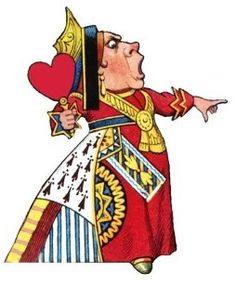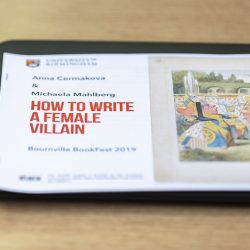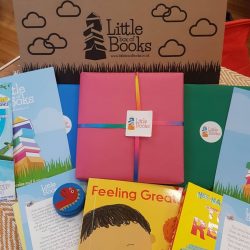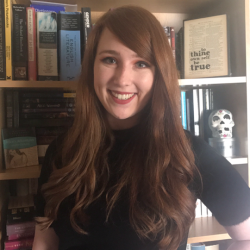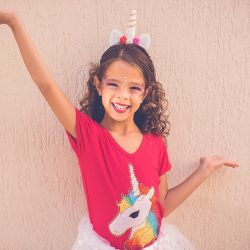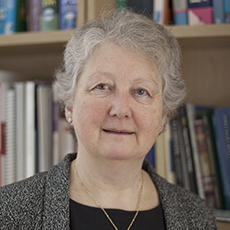The winning story in the category 13 to 15 years is ‘Grandma’s Misadventures Over the Phone’ by Iona Mandal. Why did Robin Stevens like the story? “I thought this had wonderful humour and a great sense of place – and I loved the idea of a rebellious and savvy grandma!” *** The Himalayan foothill town … Continue reading “GLARE Story Writing Competition: Grandma’s Misadventures Over the Phone (Category 13 to 15 years)”
Author: Anna Cermakova
GLARE Story Writing Competition: The Exam (Category 9 to 12 years)
The winning story in the category 9 to 12 years is ‘The Exam’ by Harry Forty. Our judge – Robin Stevens – said: “I loved the difference between how Harriet appeared to the rest of the world and what was really inside her – she’s a wonderful villain! And the twist at the end … … Continue reading “GLARE Story Writing Competition: The Exam (Category 9 to 12 years)”
GLARE Story Writing Competition: The Devil’s Daughter (Category 6 to 8 years)
And the winners are… We are pleased to share with you the winning story in the youngest category of writers of our GLARE Story Writing Competition. The winner is Isabella Gabriel with her story ‘The Devil’s Daughter’. And what did our judge – Robin Stevens – say? “I loved the energy of this story, and … Continue reading “GLARE Story Writing Competition: The Devil’s Daughter (Category 6 to 8 years)”
How to write a female villain? The GLARE workshop at the Bournville BookFest 2019
You can download a booklet with writing tips and tricks here: How_to_write_a_female_villain On Saturday, March 23, 2019, on a beautiful spring day, the GLARE team, Dr Anna Čermáková and Professor Michaela Mahlberg, enjoyed running a workshop for aspiring young authors: ‘How to write a female villain’ at the Bournville Bookfest. The workshop took place in … Continue reading “How to write a female villain? The GLARE workshop at the Bournville BookFest 2019”
World Book Day: Looking out for positive gender roles in children’s books
To celebrate World Book Day Lynsey Pollard from Little Box of Books shares with us her passion in children’s books and why it matters to think twice when choosing books for young readers. Check out some of her book recommendations! Thank you, Lynsey. Lynsey Pollard trained as a journalist and worked as a TV Producer … Continue reading “World Book Day: Looking out for positive gender roles in children’s books”
Lifting Limits for GLARE
Lifting Limits is “a social enterprise with a mission to challenge gender stereotypes and promote gender equality in and through education”. In this blog, Caren Gestetner from ‘Lifting Limits‘ shares her vision and discusses how and why we can and should challenge gender stereotypes in school environment. Caren Gestetner left a career in law to … Continue reading “Lifting Limits for GLARE”
Exploring Female Identity in Carroll’s Wonderland and Barrie’s the Neverland
In this blog, Jade Dillon discusses ideology of body symbolism related to girl characters in 19th century children’s literature. She interprets Carroll’s Alice and her growing and getting small within the context of the Victorian female ideal of a petite woman. She also looks at the contrasting female characters in Peter Pan and Wendy: Wendy, … Continue reading “Exploring Female Identity in Carroll’s Wonderland and Barrie’s the Neverland”
Dinosaurs vs. Unicorns
I heard Marianne talk about her research into textual and visual messages on girls’ and boys’ t-shirts at the PALA 2018 conference. I was fascinated. Of course, we all know about the pink vs blue war in children’s retail but for some time now I have been under the impression that things might slowly be … Continue reading “Dinosaurs vs. Unicorns”
Creating and recreating children’s manuscript magazine culture in Victorian fiction
In this blog, Lois Burke, explores how corpora of literary texts and specialised software to search through these corpora can enrich both literary and socio-cultural studies. Lois looks at ChiLit, GLARE’s 19th Century Children’s Literature Corpus, to find textual evidence in literary sources to support her research on children’s, and specifically girls’, magazine culture in … Continue reading “Creating and recreating children’s manuscript magazine culture in Victorian fiction”
Children’s Word of the Year 2018
It has become a tradition that Oxford Dictionaries for Children announce their annual ‘children’s word of the year’. For 2018 ‘plastic’ has made the top spot. Jointly with BBC Radio 2, Oxford Dictionaries for Children run a yearly competition – the 500 words challenge, where five to 13-year-old children write 500-word stories. The 500 words … Continue reading “Children’s Word of the Year 2018”

